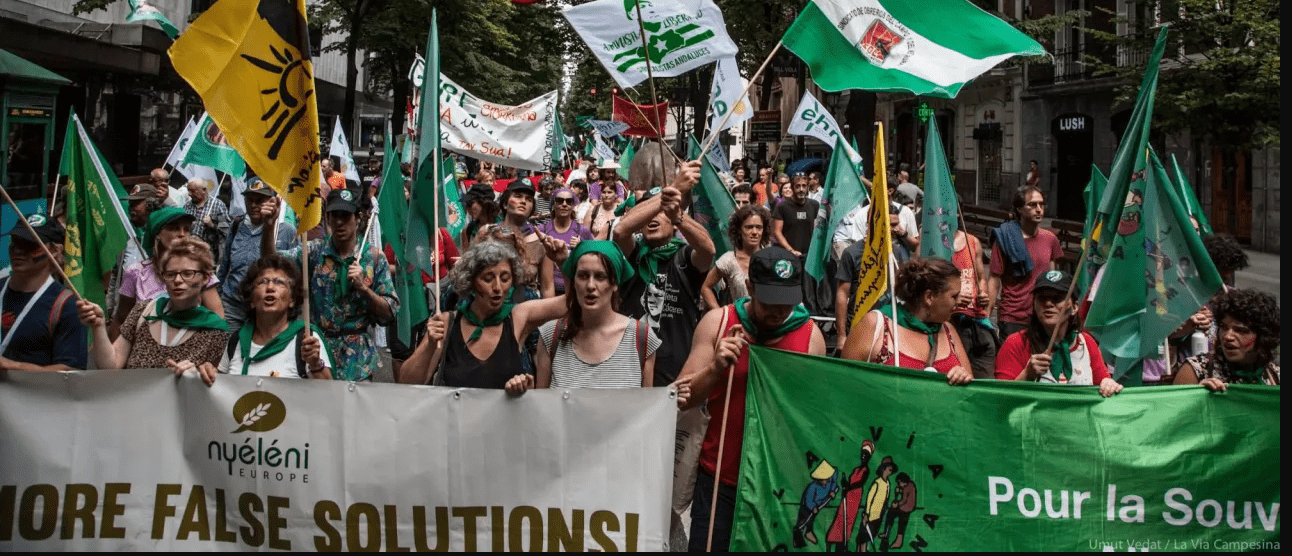This week, from July 24-26, the United Nations Food System Coordination Hub will hold a Stocktaking Moment in Rome, Italy, as a follow-up to the 2021 UN Food System Summit (UNFSS). NFFC joined thousands of allies across the world to collectively oppose the 2021 Summit based on its opaque decision-making and governance processes and its bias towards multinational corporations and agribusiness powers. We again stand firm against the Summit’s continued influence, reflected in this Stocktaking Moment, and the US government’s repeated involvement in this process.
The UN Food System Summit was taglined as the “People’s Summit”. In fact, the opposite is true.
From its onset, the UNFSS and its ongoing events have been led by those beholden to agrochemical corporations and economic forces that do not serve the interests of people and the planet. At the behest of the many corporations given undue influence, the Summit clearly focused on and promoted the sweeping use of productionist methods to solve global hunger and the climate crisis. This is not the transformative change the Summit and its follow-up events claim to seek.
The US government was an active and supportive participant in the 2021 UNFSS, and plans to support this Stocktaking Moment. The USDA Under Secretary for Marketing and Regulatory Programs, Jenny Lester Moffitt, will lead the US delegation to the Stocktaking Moment, along with the US Department of State and US Agency for International Development.
We call on USDA and the full US government’s delegation to the Stocktaking Moment to change their approach to international food and agriculture policy by prioritizing the voices of those most affected by the hunger and climate crises – peasants, Indigenous peoples, landless people, womxn, rural workers, small-scale producers, and youth.
The solutions to the global hunger and climate crises – systems based on food sovereignty, agroecology, and a solidarity economy – have been known for years. It’s time for the UN, the US and export-oriented governments to open their ears. The People’s Autonomous Response to the UN Food Systems Summit (UNFSS), the Civil Society and Indigenous People’s Mechanism (CSIPM), and many other representative groups have repeatedly highlighted the urgent, coordinated actions – led by peasants instead of corporations – that are needed to overcome the global hunger crises.
In CSIPM’s statement opposing the Stocktaking Moment, NFFC representative Patti Naylor said: “Don’t appoint the goat as gardener, a peasant proverb says. The corporate ag, food, and data giants don’t care about democratic governance in the UN – they just use it for their profits. Like the goat, corporations will eat the salad and the roses if you don’t stop them”.
This year, the United States government stepped back its efforts to undermine the historic 2018 human rights framework, the United Nations Declaration on the Rights of Peasants and other Rural Peoples (UNDROP), in international policy spaces at the United Nations, which NFFC applauds. However, we are concerned that the U.S. government continues to maintain that the peasant movement does not exist in the US. This resistance to the concept of a US peasantry completely ignores the agrarian history and status of millions of family-scale farmers and farmworkers within the US.
Under international law, a peasant is “any person who engages or who seeks to engage, alone, or in association with others or as a community, in small-scale agricultural production for subsistence and/or for the market, and who relies significantly, though not necessarily exclusively, on family or household labour and other non-monetized ways of organizing labour, and who has a special dependency on and attachment to the land (UNDROP Article 1)” – a holistic definition that clearly applies to most family farmers in the US and members of the National Family Farm Coalition.
The marginalization of peasants, farmers, and rural peoples is an underlying problem in the US, demonstrated by a widening wealth gap and rural poverty rate 3% higher than in urban areas. Additionally, 2017 data showed that rural households faced disproportionate rates of food insecurity, comprising 18% of total food insecure households in the US despite representing 14% of the total US population.
Poverty and hunger rates in rural areas are even higher among historically underserved communities. These conditions are shaped, and could be alleviated by, pro-farmer policies and public institutions taking a human rights-based approach to strengthening small-scale agriculture in the US and curtailing corporate power in our food system.
We recognize the influence of the US government on global decision-making processes. With that in mind, NFFC encourages a new direction that honors democratic values for US engagement with United Nations-led international spaces, including the UNFSS Stocktaking Moment. If the US delegation sincerely wishes to address global food insecurity and the climate crisis, it must bring the needs of peasants in the US and globally to the forefront, not the interests of agribusinesses that have largely succeeded in gaining control over agricultural inputs, markets, and profits.
This blog first appeared on the website of the National Family Farm Coalition.
Editor’s note: An earlier version of this article mistakenly attributed it to the National Farmers Union in Canada. We regret the error.
This post is also available in Español.

